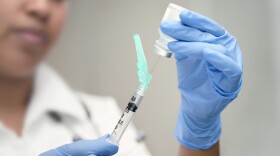-
COVID is surging, but new vaccines have been approved. Here’s what to know
-
The public is likely to be exposed to coronavirus, flu, and RSV in the coming months. Here’s what people should know about these viruses and the available vaccines.
-
Congress rejected pleas from the White House to pump more money into programs that ensure COVID tests, treatments and vaccines are free for everyone. Public health experts warn the funding cuts will worsen health disparities and hurt those who are already most vulnerable.
-
Two years into the pandemic, data shows that the toll on children’s mental health has been profound. Children of frontline health care workers had a front row seat to the pandemic’s scariest moments from day one.
-
U.S. hospitalization rates more than doubled during the latest omicron wave compared to the prior delta wave, according to a new study from the U.S. Centers for Disease Control and Prevention. Black adults were more likely to end up hospitalized than White adults, regardless of their vaccination status.
-
Stories about the stress health care workers on the frontlines have experienced are common. But their families have also been on an emotional rollercoaster for more than two years.
-
Some small towns in the Midwest are growing due to an influx of immigrants, which includes some who speak rare languages. Hospitals and community leaders have had to adapt to make COVID vaccines accessible to those communities.
-
When the pandemic forced schools to close in 2020, children spent more time at home. That’s when calls to national and local domestic abuse hotlines skyrocketed, advocates say.
-
Research suggests breast milk from vaccinated mothers offers at least some protection against the coronavirus. With children under 5 still too young for the vaccine, some parents are seeking out donated breast milk with antibodies for protection.
-
As the pandemic drags on, doctors continue to be pulled away from their normal duties to care for COVID patients. For early-career physicians, that means less time for specialized training.
-
There is so much data related to COVID-19 available that it can be hard to make sense of it all.To get some clarity on the issue, Side Effects Public Media and Indiana Public Broadcasting spoke with experts about how to find COVID-19 data and how to use it to guide decision-making.
-
The job of a correctional officer is to keep people safe. But inside prisons across the U.S., allegations of sexual abuse are common. The latest national data shows nearly 6,000 reports of staff sexual misconduct in 2018.
















